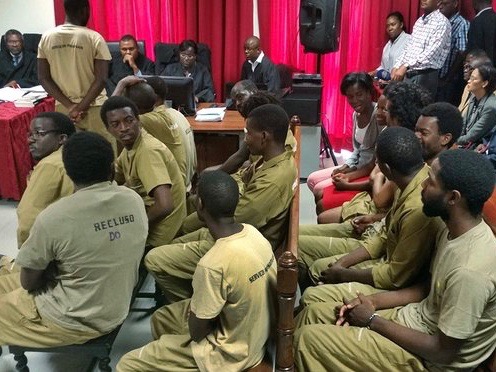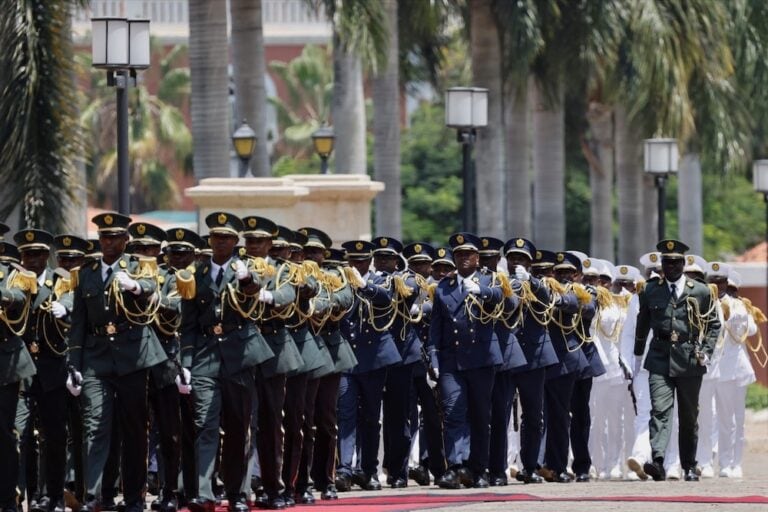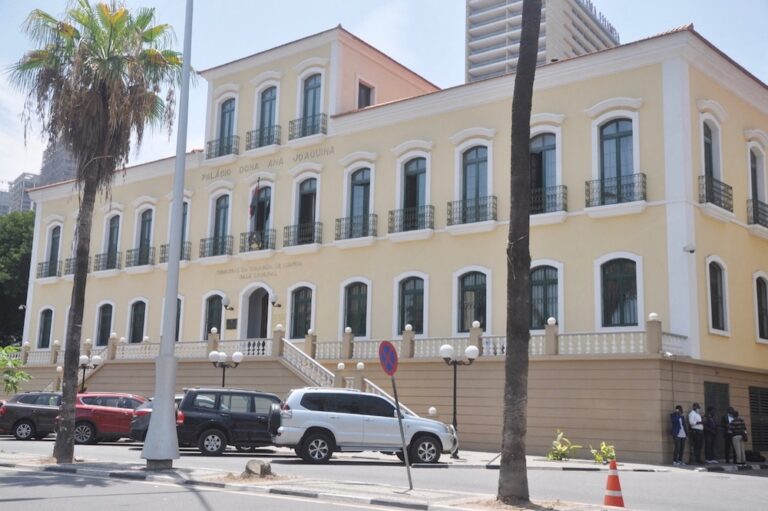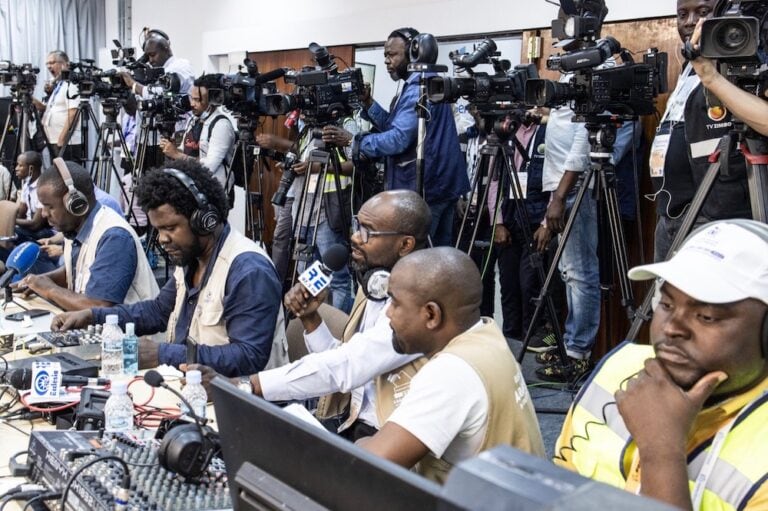17 Angolan activists, known as the Luanda Book Club, were sentenced to between 2-8 years in prison after having gathered to read Domingos da Cruz’s unpublished manuscript Tools to Destroy a Dictatorship and Avoiding a New Dictatorship – Political Philosophy for the Liberation of Angola.
This statement was originally published on pen-international.org on 31 March 2016.
PEN International is concerned at news that 17 Angolan activists, known as the Luanda Book Club, were sentenced to between 2-8 years in prison and fined 50,000 kwanza (around 300 USD) on Monday, 28 March 2016, for ‘preparatory acts of rebellion’ and ‘criminal conspiracy’. An earlier charge of ‘attempting against the president’s life’ was dropped by the prosecution on 21 March 2016.
The activists had gathered at a book store in the capital Luanda, to read Domingos da Cruz’s unpublished manuscript Tools to Destroy a Dictatorship and Avoiding a New Dictatorship – Political Philosophy for the Liberation of Angola, an adaptation of US academic Gene Sharp’s book From Dictatorship to Democracy: A Conceptual Framework for Liberation. Sharp’s book is described as a blueprint for non-violent resistance to repressive regimes, the meeting to discuss the book was considered by the authorities to be a preliminary act to a coup.
The 17 activists include writer, journalist and university lecturer Domingos da Cruz, author of the manuscript they were reading at the book club; journalist and law student Sedrick de Caravlho, the book’s designer; university lecturer Nuno Alvaro Dala, one of the lecturers of the seminars/discussions. Also arrested were rappers Luaty Beirão, Hitler Jessy Chiconde (also a university student) and teacher José Hata. Both the prosecution and defence lawyers have said they will appeal the verdict and sentences.
PEN International calls on the Angolan authorities to immediately and unconditionally release the writers and activists and quash their convictions. Angolans have the right to express themselves politically and protest peacefully via book club discussions or other means and restrictions on this is a violation of their rights to freedom of expression and assembly.
Take action: Share on Facebook, Twitter and other social media
Please send appeals:
- Expressing concern at the conviction and sentencing of Domingos da Cruz, Sedrick de Caravlho, Nuno Alvaro Dala, Luaty Beirão, Hitler Jessy Chiconde and José Hata and the other activists;
- Calling for the Angolan authorities to quash the conviction of Domingos da Cruz, Sedrick de Caravlho, Nuno Alvaro Dala, Luaty Beirão, Hitler Jessy Chiconde and José Hata and the other activists;
- Calling for the immediate and unconditional release of Domingos da Cruz, Sedrick de Caravlho, Nuno Alvaro Dala, Luaty Beirão, Hitler Jessy Chiconde and José Hata and the other activists in accordance with Article 19 of the International Covenant on Civil and Political Rights, to which Angola is a signatory.
Appeals to:
President of the Republic of Angola
José Eduardo dos Santos
Fax: +244 222 370366
Civil House: +244 222 693274
Spokesman: +244 222 693069
Salutation: A sua Excelencia
Ministry of Justice and Human Rights
Rui Jorge Carneiro Mangueira
Ministry of Justice and Human Rights
Rua 17 Setembro, No. 32
CP 1986
Luanda
Republic of Angola
Fax: +244 222 339 914 or +244 222 330 327
Salutation: A sua Excelencia
Twitter:
**Please send appeals immediately. Check with PEN International if sending appeals after 30 April 2016.***
Please copy your appeals to the Embassy of Angola in your country. A list of embassies can be found here.
Please send us copies of your letters or information about other activities and of any responses received.
Publicity
PEN members are encouraged to publish articles and opinion pieces in your national or local press highlighting the case of the Luanda Book Club.
Background
Thirteen of the activists were arrested on 20 June 2015 at a book store in the capital Luanda, where they had gathered to read Domingos da Cruz’s unpublished manuscript Tools to Destroy a Dictatorship and Avoiding a New Dictatorship – Political Philosophy for the Liberation of Angola, an adaptation of US academic Gene Sharp’s book From Dictatorship to Democracy: A Conceptual Framework for Liberation. Sharp’s book is described as a blueprint for non-violent resistance to repressive regimes, and this meeting to discuss the book was considered by the authorities to be a preliminary act to a coup.
Domingo da Cruz had been due to attend the meeting but did not; he was arrested the following day on 21 June 2015. Osvaldo Caholo was arrested on 24 June 2015. Two others were arrested later in connection with the case, but they were not detained.
On 22 June police forces searched the houses of the activists and confiscated computers, phones, photos, diaries, credit cards and copies of Domingo da Cruz’s book. The 15 were initially accused of ‘preparing acts aimed at disrupting public order and security in the country’. It was later reported that they were charged with ‘rebellion’, ‘attempted coup d’état’ and ‘crimes against national security’. The case was based on the Special Punishment of Preliminary Acts to a Coup law (Act n. 23/10, 3rd December). Actions defined under the Act include the purchase of arms, ammunition and the organisation of private armies. In this case the meetings to discuss a book about peaceful transition to democracy were considered as preparatory measures. PEN International considers this to be an unjustifiable interpretation of the law and a violation of the right to freedom of expression and association.
Between June and December 2015, 15 of the activists were in jail. A few months after their imprisonment without charge, the 15 were eventually brought to trial. Their trial started on 16 November 2015 and was originally held in secret, in contravention of article 407 of the Angolan Code of Criminal Procedure which provides as a general rule that trials are subject to publicity. A secret trial can only happen in extreme situations.
Article 414 of the Code states that hearings must be continuous and uninterrupted, except when absolutely necessary. However, the trial was marred by irregularities including constant postponements, suspensions and delays, allegedly due to the judicial noticing of witnesses. Domingos da Cruz and three other defendants initiated a hunger strike on 10 December 2015 in protest against the ongoing delays of the trial. On 14 December 2015, Carvalho published a letter where he exposed the conditions of his detention and suggested that the trial held on 16 November 2015 was a sham. He said he had been held in solitary confinement for around 2,000 hours without the possibility of seeing sunlight. He went on hunger strike and on 15 December 2015 he attempted suicide but was rescued by prison guards. The same day the Luanda Provincial Tribunal approved the demand of the public prosecutor to transfer the activists to house arrest, which they were.
The reasons for keeping the activists under house arrest were not clear. The decision made by the judge to did not give any justification, beyond a literal transcription of the law. This runs contrary to the law concerning precautionary measures (Act n. 25/15, 18th December), Articles 18 and 19 of which state that reasons for house arrest or pretrial detention must be specified and specifically justified concerning each individual, however this did not happen in this case.
In March 2016, two of the 15 activists were sent back to jail through extra summary trials. The 19-year-old university student Nito Alves complained that the trial was a farce, and was sent back to prison for contempt of court. University lecturer Nuno Álvaro Dala, who was ill, refused to return to court while being denied medical care, and the judge also sent him back to jail.
The trial, widely condemned as politically motivated by human rights organisation around the world, was reported by journalists as farcical – the presiding judge allowed the state prosecutor to wear a hairpiece that obscured half her face, ordered a public reading in full of the 200-page unpublished book written by defendant Domingos da Cruz and issued witness summonses by publishing names in the state-owned newspaper Jornal de Angola.
According to reports, in her closing remarks, the state prosecutor told the court that the weekly meetings of the activists between May and June 2015 were not held just to study the book but that they were plotting to carry out acts of rebellion and as such should be found guilty of ‘criminal conspiracy’ and ‘preparatory acts of rebellion’. According to reports, da Cruz was sentenced to eight-and- a-half years in prison for ‘leading the criminal association’. Beirão was sentenced to five-and-a-half years for ‘falsifying documents’. The others all received prison sentences ranging from two years to four- and-a-half years.
Freedom of expression in Angola is severely restricted. Laws such as criminal defamation are used to silence critics, such as prominent journalist and human rights defender Rafael Marques de Morais who was charged with criminal defamation in relation to his 2011 book Blood Diamonds: Torture and Corruption in Angola which detailed killings and torture, perpetrated by private security guards working for mining companies in Angola’s diamond fields. It also levelled responsibility for abuses at several generals who owned the mines, for failing to stop the abuses. Following publication, the generals lodged a defamation complaint against him. An appeal is still pending at the Supreme Court.
Angola has persecuted other journalists and activists over the years, including Domingos da Cruz who had previously been arrested in 2013 and put on trial accused of inciting civil disobedience because of a text he published that was critical of the President.
In 2013, Manuel Nito Alves was jailed for two months for printing t-shirts that carried a slogan calling President José Eduardo dos Santos a ‘disgusting dictator.’
For further information please contact Lianna Merner at PEN International, Koops Mill Mews, 162-164 Abbey Street, London SE1 2AN, Tel.+ 44 (0) 20 7405 0338, Fax: +44 (0) 20 7405 0339, email: lianna.merner@pen-international.org



